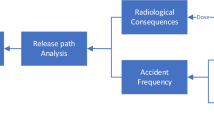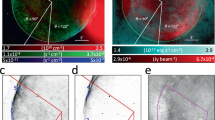Abstract
FARMER1 has argued that any nuclear power reactor is in principle capable of offering a range of risk to life and property and that the plant safety standards should be controlled so that the larger consequences have an associated lower risk. Discussing appropriate standards, he observes that the permissible frequency for the largest accidents seems to be in the range 10−6 to 10−8 (reactor years)−1, depending on the system of extrapolation for risk versus accident size.
This is a preview of subscription content, access via your institution
Access options
Subscribe to this journal
Receive 51 print issues and online access
$199.00 per year
only $3.90 per issue
Buy this article
- Purchase on Springer Link
- Instant access to full article PDF
Prices may be subject to local taxes which are calculated during checkout
Similar content being viewed by others
References
Farmer, F. R., Siting Criteria, a New Approach, I.A.E.A. Symposium on Containment and Siting of Nuclear Power Reactors, Vienna, April 1967.
Terry, K. D., and Tucker, W. H., Science, 159, 421 (1968).
Ginzburg, V. L., The Origin of Cosmic Rays (Pergamon, 1964).
Author information
Authors and Affiliations
Rights and permissions
About this article
Cite this article
BOWEN, J. Risk from Supernovae compared with Risk Standards for Nuclear Reactors. Nature 220, 303–304 (1968). https://doi.org/10.1038/220303a0
Received:
Issue Date:
DOI: https://doi.org/10.1038/220303a0
Comments
By submitting a comment you agree to abide by our Terms and Community Guidelines. If you find something abusive or that does not comply with our terms or guidelines please flag it as inappropriate.



